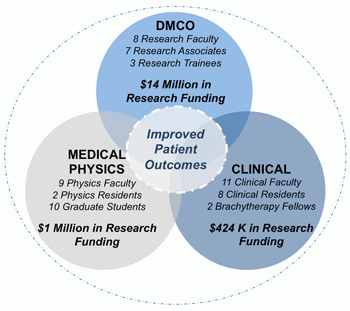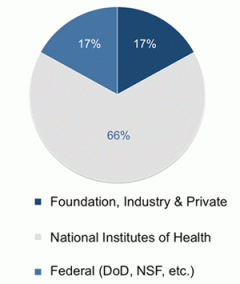Research & Technologies
Overview
The Department of Radiation Oncology is home to a robust team of researchers and clinicians who work tirelessly to advance patient care through research supported by external grant funding, industry partnerships, and university wide collaborative efforts.

We are devoted to conducting translational research, a type of combined clinical and basic science investigation in which knowledge learned from the basic research in the laboratory with genes, cells, or animals is translated into therapeutic intervention in human subjects. Without translational research, much of what we have learned in the laboratory would not have been applied to the treatment of human cancers.
Over the past year, our researchers submitted over 60 research proposals to federal, national and private sponsors. The researchers, trainees, residents, graduate students and research staff across basic (The Division of Molecular and Cellular Oncology, DMCO), medical physics and clinical research units within the department are responsible for maintaining a research grant portfolio of over $15.4 million. Our overall research mission is to continue this proven track record of success, to support innovation and to increase the clinical impact of research outputs through strengthened collaboration and knowledge sharing.
Mission
The Department of Radiation Oncology’s dedication to delivering conscientious and compassionate care for our patients and their families is predicated on a patient-centric approach to precision healthcare. This dedication is complimented by our mission to advance cancer treatment through research and the application of emerging technologies, translational diagnostics, and individualized treatments for each patient. These principles are broadly applicable across cancer types and to all of the cancer specialties.
Division of Molecular and Cellular Oncology (DMCO)

The DMCO is dedicated to developing an infrastructure in basic and translational research using molecular and cellular profiling that can personalize treatment and integrate across specialties, allowing improved outcomes and patient satisfaction, resulting in more effective and efficient cancer treatments. Several research foci and programs have been defined within the DMCO, including, cancer stem cells, immunology and radiotherapy, radiation mitigation and germ-line mutations.
For the past 10 years, the DMCO has led a NIH-funded Center for Medical Countermeasures Against Radiation program (UCLA CMCR) – one of only a handful in the country. Furthermore, DMCO has several specialized cores that serve not only Radiation Oncology faculty and students but researchers broadly throughout UCLA. These cores include a gnotobiotic mouse facility (including germ-free, immune competent and immune deficient mouse colonies), a radiation core, and a biobanking core that includes a human tumor collection, lymphocyte immortalization and germ-line and immune sample biobanking, and a core testing agents for combined efficacy with radiation therapy.
Medical Physics Research Program
1. Research
The Medical Physics unit strives to develop scientists who can apply physics, mathematics, engineering and computer science theories to the practice of radiology, nuclear medicine and radiation oncology.
The overall goal of the researchers and medical physicists is to address research problems that are directly related to patient safety, quality and innovative treatment techniques. Specific research foci include, improving dose conformality, 5D computed tomography (CT), 3D treatment space imaging systems for radiation therapy, and 4Pi radiation therapy which is considered to be the most exciting development in the field in recent years.
2. Biomedical Physics Interdepartmental Graduate Program
The goal of the Biomedical Physics Interdepartmental Graduate Program is been the development of research scientists who are well versed in physics, mathematics, engineering and computer science, and who understand the application of these disciplines to the instruments and techniques used in the practice of radiology, nuclear medicine and radiation oncology. (Read more)
Clinical Research Program
With the goal of discovering innovations in the treatment of cancer patients, the clinical research staff focuses on patient-oriented research, epidemiological and behavioral studies, and outcomes and health services research. The key areas of research include developing a robust case registry for radiotherapy patients, building remote capabilities for acute and long-term patient monitoring (including mHealth and Telehealth), and continued attention on health services research that focuses on issues of access, cost, quality and outcomes in healthcare. This research also extends to all cancer specialties in working to develop the best approaches for management of patients with metastatic disease. This cohesive research division allows clinicians, researchers and trainees to improve effectiveness of treatment, ensure the highest quality of care that patients receive, and allow the best health outcomes.
Funding
The Department is very successful in obtaining extramural funding to support research activities, training and education.

Contact Us
If you are interested in joining a clinical trial or would like more information regarding clinical trials and/or which trials are currently being performed in our department, please contact the Clinical Research Team, (310) 825-6577.